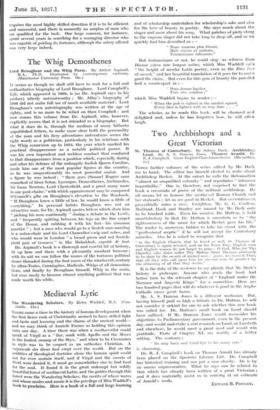Mediaeval Lyric
The Wandering Scholars. By Helen Waddell, M.A. (Con- stable. 21s.) • - THERE came a time in the history of human development when the first fierce rush of Christianity seemed• to have stifled light and taste and learning and the charm of the ancient world— and we may think of Anatole France as holding this opinion unto our day. A time there was when a mediaevalist could speak of Virgil as a "liar, sunk with Apollo and the Muses in the foulest swamp of the Styx," and when to be Ciceronian in style was to be suspect as an orthodox Christian. A crepuscule des dieux had crept over the world. But on the aridities of theological doctrine alone the human spirit could not for ever sustain itself, and if Virgil and the sweets of Ovid were denied it, it must go somewhither else to find food for the soul. It found it in the great unkempt but wildly beautiful forest of mediaeval Latin, and the guides through this forest were the Wandering Scholars, the merits of whose wares and 'whose modes and music it is the privilege of Miss Waddell's book-to proclaim. Here is a book of a full and large learning
and of scholarship undertaken-for scholarship's sake and also for the love .of beauty in poetry.. She says much about the singer and more about his song. What patches of piety clung to the vagrorn singer did not take long to drop off, and so wo quickly find him described as :- " None vesanus plus Oresto,
• Male -vivens et moleste,_ Trutannizans inhoneste."
But trutannizans or not, he could sing—as witness Duns Dianae [-urea sero lampas oritur, which Miss Waddell calls " the height of secular Latin poetry, even as the Dies Irt e of sacred," and her beautiful translation of it goes far to mal c
good the claim. But even for this gem of beauty the parodist had a counterpart in :—
" Dum domus lapidea Fero sita cermtur ;" which Miss Waddell begins to render :- " When the pub is sighted in the market squat°, Every face is lighted with its rosy flare . . .
The scholar, as he reads this book, will be charmed and
delighted and, unless he has forgotten how, he will often laugh.














































 Previous page
Previous page